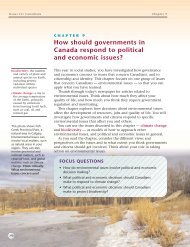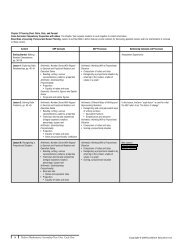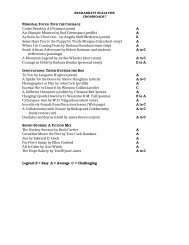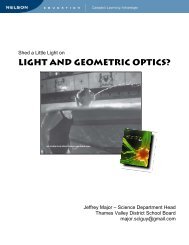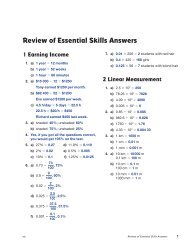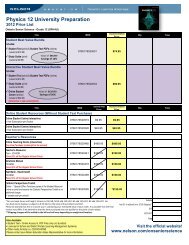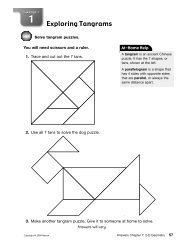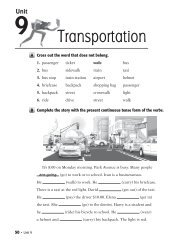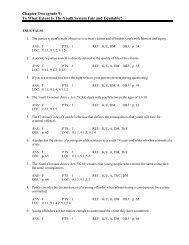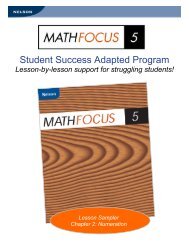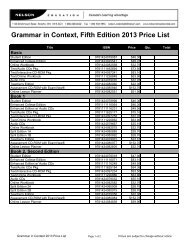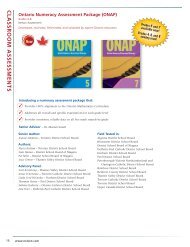PRE-PUBLICA TION EDITION - Nelson Education
PRE-PUBLICA TION EDITION - Nelson Education
PRE-PUBLICA TION EDITION - Nelson Education
You also want an ePaper? Increase the reach of your titles
YUMPU automatically turns print PDFs into web optimized ePapers that Google loves.
This is a valid research method, but differentscientists use different skills, technologies, andmethods. There are similarities, however. Sciencefollows procedures that generally lead to a logicalconclusion, which addresses the goal of theinvestigation. However, there is no single scientificmethod that all scientists follow, step by step. Theterm “scientific method” refers to the general typesof mental and physical activities that scientists use tocreate, refine, extend, and apply knowledge.Misconception #2: Science always involvesexperimentation.Experimentation is not the only approach toconducting scientific investigations, nor is it the onlyway of building scientific knowledge. Many scientificinvestigations are not experiments. Some sciences,such as astronomy and environmental science, donot lend themselves to experimentation becausescientists cannot control the conditions in whicha phenomenon occurs. Other types of scientificinvestigations are equally valid for producingvaluable scientific knowledge. For example, most ofour understanding about climate change is basedon extensive observations and analysis of naturallyoccurring phenomena.Misconception #3: Science investigationsprovide proof.Although scientific investigations can result inscientific knowledge, they cannot provide proof.Empirical evidence can support or validate a lawor theory but can never prove a law or theory to betrue. Science can only show that an idea is false ordisproven. Consider the law of gravity. The evidencecollected worldwide leads scientists to concludethat objects denser than air always fall downward,or toward Earth’s centre. An observation in whichan object denser than air falls upward (away fromEarth’s centre) would seriously challenge our currentunderstanding of the law of gravity.Scientific laws are reliable. Because they arebased on such vast numbers of observations, itis very unlikely that evidence will be found toprove them false. In fact, scientific laws are seldomproven false. The law of gravity and other scientificlaws are probably as close to scientific “truth” aswe may ever come.Misconception #4: Science is not verysuccessful.Science is often criticized because of what it has notdone—for example, it has not found a cure for canceror the common cold. However, when we consider theoutstanding achievements of science, we can see that ithas been very successful in helping us understand thestructure of the natural world and how it functions.For example, we are confident in our knowledgethat matter is made of non-visible atoms, that livingthings are made of cells that pass on information inthe genetic material DNA, and that the continents areslowly moving across the surface of Earth.Scientific and technological knowledge has allowedus to land on the Moon, communicate at the speedof light, and perform open-heart surgery. Recentadvances in the diagnosis and treatment of cancerare possible because scientists are learning more andmore about what causes cancer and how differenttypes of cancers behave. A cure for all cancers hasnot yet been found, but the knowledge that is beinggathered may one day provide this cure. Science isnot perfect, but it is the most reliable way we have toexplore and make sense of the natural world.Misconception #5: Science can provide theanswers to all questions.Although scientific inquiry is a highly efficientway to learn about the structures and functions ofthe natural world, it cannot answer moral, ethical,and social questions. Should we allow mining inenvironmentally sensitive areas? Which of 10 patientsshould receive a donor kidney? Questions suchas these cannot be answered by science. Scientificknowledge can, however, provide information to helpindividuals and groups make important decisions onsuch issues.650 What Is Science? NEL



